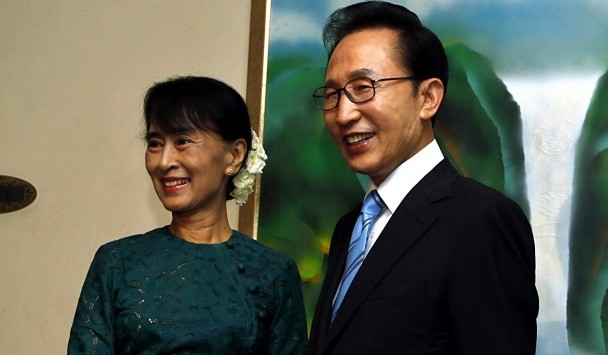WASHINGTON D.C.—Burmese opposition leader Aung San Suu Kyi is cautiously backing a US senator’s proposal to suspend US economic sanctions.
Suu Kyi said on Tuesday that suspending, rather than eliminating, sanctions would send a message that the US is trying to help the country move toward democracy, but would consider other steps if the Burmese people’s aspirations aren’t met.
Her comments, made during a video link-up organized by the George W. Bush Institute in Washington, followed Sen. John McCain’s proposal on Monday that the US suspend all economic sanctions other than an arms embargo, as the European Union has done.
“This is a possible first step,” the Nobel Laureate said from Rangoon to an audience that included the former US president and his wife, Laura Bush. “I am not against the suspension of sanctions as long as the people of the United States think this is the right thing to do at the moment.”
Suu Kyi has given a similar endorsement to the EU move. However, she cautioned on Tuesday against undue optimism about the situation in the country, which is officially known as Myanmar. She said political reform would only be irreversible when the military—which has dominated government rule for five decades—officially committed itself to democracy.
She did not elaborate, but later said a principal aim of her party was to reform the 2008 Constitution, which guarantees a quarter of parliamentary seats to the military, and strengthen the legislature so it becomes “a genuine democratic institution.”
The United States and other Western nations have moved to ease sanctions on Burma to reward it for its shift from oppressive, and sometimes bloody, direct military rule, particularly after Suu Kyi and her National League for Democracy (NLD) swept special elections in April and won dozens of seats in Parliament.
The US has moved more cautiously than the EU. Human rights groups are especially opposed to foreign investment in lucrative sectors such as oil, gas, mining and timber, where they say the interests of local people could be trampled, and where the military and its business cronies would be best-placed to cash in.
The Obama administration last month announced a targeted easing of a ban on US investment, but hasn’t provided details, and still retains trade sanctions.
A Democrat and Republican senator recently advocated lifting all economic sanctions while still barring some blacklisted Burmese entities. McCain proposed a suspension of sanctions but stressed there should be standards of corporate responsibility for US businesses in Burma to strengthen the private sector there and loosen military control of the economy.
Suu Kyi is deeply respected on both sides of Congress, and her endorsement is an important guide for US policy.
Despite widespread popular support and the remarkable changes Burma has seen over the past year, rights groups say reforms have yet to touch the lives of most people and Suu Kyi and her party have little institutional power. The NLD holds less than seven percent of seats in Parliament, which remains dominated by the military and its proxies.
Suu Kyi on Tuesday acknowledged that the military, with its guaranteed bloc of 25 percent of the seats, could effectively block any amendment of the constitution as that requires a 75 percent majority vote.
Suu Kyi, who spent a total of 15 years under house arrest until her release in late 2010, also complained that 271 political prisoners named on a list submitted by her party were still being held despite government assurances. A January amnesty saw hundreds of prominent detainees freed.
“There should be no political prisoners in Burma if we are really headed to democratization,” Suu Kyi said.















